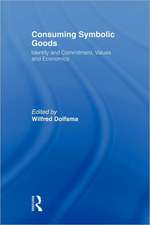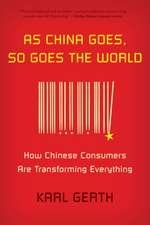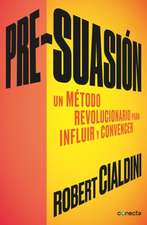Culture and Commerce – The Value of Entrepreneurship in Creative Industries
Autor Mukti Khaireen Limba Engleză Hardback – 19 iun 2017
Preț: 475.64 lei
Preț vechi: 587.21 lei
-19% Nou
91.03€ • 94.68$ • 75.15£
Carte tipărită la comandă
Livrare economică 15-29 aprilie
Specificații
ISBN-10: 0804792216
Pagini: 280
Dimensiuni: 152 x 229 x 18 mm
Greutate: 0.5 kg
Editura: MK – Stanford University Press
Cuprins
The worlds of business and culture are seen as unrelated, even opposing. This chapter describes why and how the two are related. Creators, producers, and intermediaries constitute a value chain in markets formed at the intersection of commerce (where producers, with goods for sale, reside), commentary (discourse generated by intermediaries as well as producers that contributes to construction of value of goods), culture (beliefs about value, influenced by the commentary), and consumption (acquiring goods aligned with cultural norms and therefore valued). Markets for symbolic and new products require higher levels of commentary than those for utilitarian and well-understood products, given the greater need to assess and construct the value of these products. Pioneer entrepreneurs create markets for new cultural goods by first establishing them as appropriate and valuable to induce their consumption. This requires changing conventions of appropriateness and value, which in turn can effect cultural change.
This chapter describes pioneer entrepreneurs and their cultural impact. Because market creation is influenced by commentary as well as commerce, pioneer entrepreneurs may be new or established producers or intermediaries in the value chain of their industries. This is a unique conception of the entrepreneur. Consumption of cultural goods (more than other kinds of goods) is influenced by cultural norms that define individuals' core beliefs about appropriateness and value, as well as their sense of identity. Therefore, pioneer entrepreneurs in creative industries face a formidable challenge when introducing new cultural goods; often, such new goods may not align with prevailing cultural norms, making it difficult to create a market for them. The same challenge also gives pioneers a significant opportunity to influence and change culture by creating a market for new goods through generating discourse that changes cultural norms, optimal framing, and generating consensus about the value of the good.
Intermediaries are entities¿individuals or organizations¿that do not have a direct economic stake in the value of goods. Intermediaries can either reinforce and confirm prevailing conventions of appropriateness and value or challenge and change them. The second option results in market creation as value conventions and norms are changed. Pioneer intermediaries may have the greatest potential to effect cultural change; because they are evaluators and endorsers with no economic incentive in the market, their discourse is more credible than that of producers and therefore more influential in changing culture. However, doing business as an intermediary is difficult because, by definition, they cannot capture the value they construct. Intermediaries have to adopt complex two-sided business models and face challenges in balancing revenues with relevance and managing a dual identity. Despite this, the potential for broad cultural impact is an attractive aspect of being an intermediary.
This chapter systematically explicates how intermediaries construct the value of cultural goods to better understand the entrepreneurial implications of their functions. Three key properties of cultural goods¿high symbolism, proliferation, and subjectivity¿juxtaposed against three key valuation elements¿categories, criteria, and standards¿define the specific functions that intermediaries perform. Intermediaries make cultural goods visible through introduction, the sharing of information. They also instruct consumers, that is, they decode the symbolic meaning and value of the good. Finally, intermediaries perform the inclusion function, selectively validating the quality of certain cultural goods. These functions, although neither sharply demarcated nor linearly executed, result in a value pyramid, where goods at the highest apex of quality fetch either very high aggregate sales or individual prices. Operating as an entrepreneurial intermediary¿pioneering or otherwise¿that performs one or more of these functions brings different sets of challenges and has different implications for effective market creation.
This chapter describes the prerequisites¿independence and expertise¿that intermediaries must possess to perform their crucial functions, exert power over producers and consumers, and influence the market. Independence has structural, economic, and cognitive dimensions. An intermediary perceived as or known to be corrupted or co-opted by creators or producers would have no, or worse, a negative influence on value construction and market creation for a cultural good. Intermediaries accordingly develop ways of demonstrating their independence. For their discourse to be credible and influential, intermediaries must also possess and demonstrate expertise. Both prerequisites are assets of intermediaries and play a role in maintaining their financial viability, but neither can be actively managed nor speedily built. This has significant implications, examined in detail in this chapter, for new intermediary ventures as well as pioneer intermediaries.
Producers are firms that have a direct economic stake in the value of the goods they bring to market. These are distinct from the individuals who create the good: creators, such as artists, musicians, and writers. Creators rarely take their creations directly to market; in most cases, a third-party firm¿a producer firm¿vets and collates many different creations to present to the consumer. Elsewhere, fashion designers and chefs often start their own firms¿creator firms¿that sell only their own creations. All producers must bridge the worlds of art and business, which entails three challenges: market making, building and maintaining trust between managers and creators, and reputation building. Creator firms may be more likely to introduce content innovations, and producer firms may introduce delivery innovations, while some innovations may combine both. Inducing consumption of these innovations requires changing beliefs, making it the most challenging kind of pioneer entrepreneurship.
Because they operate at the cusp of culture and commerce, which are two very different worlds, producers face significant operational challenges that increase the uncertainty they face and decrease their power balance in the ecosystem. In particular, producers¿both creator firms and producer firms, albeit to varying degrees¿are constrained by the power wielded over them by cultural norms, by intermediaries, and by creators. The locus of these tensions is the product that producers bring to the market and about which they can neither create nor harbor illusions. Entrepreneurship¿pioneer entrepreneurship and otherwise¿as a producer is therefore exceedingly difficult and should be undertaken only by highly motivated, dedicated individuals.
This chapter explores the strategies adopted by producers, who must balance financial and cultural imperatives to maintain viability and standing in both the artistic and the business worlds, each of which has a different, sometimes contradictory institutional logic. Mirroring the strategies used by individual creators, producers attempt to balance both worlds by maintaining varying degrees of separation between the two worlds¿blending (no separation), loose coupling or portfolio (some separation, maintained through the production of multiple product lines), and decoupling (complete separation through production of unrelated products or by adopting a not-for-profit business model). Each of these strategies is differentially appropriate for creator firms versus producer firms, and each has specific implications for pioneer producers and new producer ventures, all of which are explored.
Globalization and digitalization¿the opening of economies across the globe and the advent and spread of the digital medium, respectively¿have made the world smaller today. Although this new world has had positive implications for entrepreneurs and pioneer entrepreneurs, it has had negative impacts for incumbents in the creative industries. This chapter addresses the question of whether rules governing the structure and functioning of creative industries are relevant in the current context. Although globalization has typically generated market creation opportunities for pioneer producers and pioneer intermediaries, digitalization has not significantly affected the creation of new categories but has instead provided a new medium for commentary as well as commerce. Understanding how these developments affect creators, producers, and intermediaries suggests that the "old" rules, being foundational, are still applicable and should be followed by firms, creators, and consumers desirous of living in a civil society capable of rejuvenation and change.




















